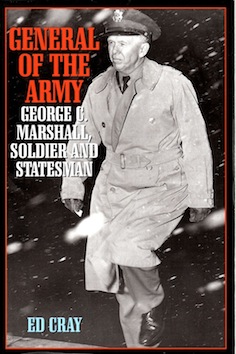The man – George C. Marshall – emerges from all the deeds, but the deeds are numbing in number and variety.
Marshall seems a giant. Detached, objective, aloof even, dedicated, industrious, creative, painfully courteous and equally persistent, always focussed on the big picture, ever constrained by the gravity of reality, and yet always moving forward through the treacle of congressional committees, presidential temporizing, endless inter-service bickering, personal animosities, obstreperous subordinates like George Patton and Douglas MacArthur who seldom acknowledged let alone obeyed an order, the ever more assertive distractions of the press feeding-frenzy, all if this nearly everyday.
Patton and MacArthur seem like strutting peacocks in comparison to Marshall who commanded thunderbolts from the sky and the very earth itself to yield the men and material he needed to make war and to make peace.
My source is Ed Cray, General of the Army: George C. Marshall, Soldier and Statesman (1990).

When an alcoholic senator from Wisconsin attacked him, Marshall seems almost Olympian in his icy and terse dismissal of the words of that ‘unfortunate man.’ I swore long ago that this senator’s name would never cross either my lips or my keyboard. If that is too cryptic, so be it.
The stories are many. Of course, Marshall spoke of none of these things. He refused the publishers’ millions to write memoirs. The stories come from those who worked for and with him.
During the construction of the Pentagon, he had the Chief of Staff’s personal office located so that it looked to the Arlington Military Cemetery, that the incumbent would always be reminded of the price of his mistakes. He was Chief of Staff at the time.
From 1941 he carried in his breast pocket a copy of a letter Abraham Lincoln had written to a woman whose sons had been killed at Antietam as a reminder of cost and compassion. The letter gradually perished from repeated re-reading and re-folding over the years, the faster when his only son was killed at Anzio in 1943.
In a conference in 1942 when Churchill went into his oft repeated flight of fancy that nibbling at the edges of Europe in Crete or the Balkans would some how, abracadabra, defeat Nazi Germany, Marshall said, ‘Not one of my soldiers is going to die in a useless sideshow.’ That was an uncharacteristic explosion of frustration.
When he resisted joining Britain in killing civilians with saturation bombing, in the name of allied co-operation his political master loosened his control of the air force so the bombing could go on. Marshall resisted this bombing because he was not convinced it would hasten the end of the war in Europe by a single day. The post-war Strategic Bombing Survey confirmed Marshall.
He had no doubts that the atomic bomb had to be used, anything to make an invasion of Japan unnecessary. The projections of the death and destruction of a Japanese invasion in November 1946 made even this Olympian falter. The more so because it was assumed that neither Britain nor the Soviet Union would contribute any substance to the projected two year campaign.
The pygmies criticized everything he did, and they still do.
His wife’s diary shows Marshall had 19 days off during his 47 years of service. There is a standard for all those people today who describe themselves as leaders.
Recommended for adults.
